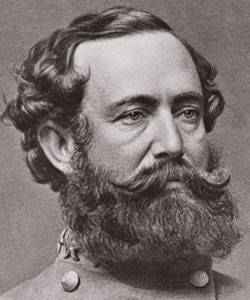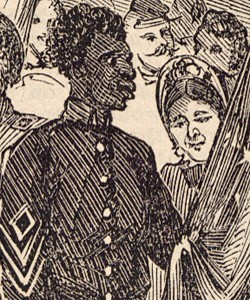Many white Southerners labeled the return of “home rule” following the Radical era of Reconstruction as a period of “Redemption.” That word, however, contained a very bitter note for anybody who believed that the aftermath of the Civil War promised equality to all and a socioeconomic revolution for the region’s dispossessed. For southern blacks, in particular, the Redeemers represented an ominous threat, not only to their rights as freemen, but to their lives. How far Redemption might go in undoing the reforms of Reconstruction –and how violent its advocates might be in that process– remained to be seen by the end of the 1870s. However, it was already clear during the Centennial Year of 1876 that violence against blacks was looming. The Hamburg Massacre in South Carolina during July 1876 offered one of the most gruesome examples. Foner describes the wanton violence against blacks in the small town, but he leaves out a discussion of the subsequent role of
Prince Rivers, the black militia leader and local trial judge charged with investigating the aftermath of the massacre. A new website from historian Stephen Berry (CSI: Dixie) offers a vivid account of the massacre and the complicated role that Rivers tried to uphold during the proceedings afterward. Students in History 118 should remember Prince Rivers, because he was the former contraband slave who been “discovered” by James Miller McKim (Class of 1828) and who subsequently emerged as a leader in the First South Carolina volunteers and a hero during the Civil War. Rivers also turned out to be a symbol of the betrayal of Reconstruction’s promise. Students should be able to explain why after reading Berry’s narrative of the Hamburg Massacre.



Alison Rice
This situation is quite interesting to me, and truly leads me to question the thought process that Prince Rivers possessed in summoning Dock Adams to court. It would make sense, in his mindset, stature, and frankly most importantly in the color of his skin, that he would use his power and position to take the side of the black militia in the case. It was honestly shocking to learn that instead Rivers proceeded to maintain his strict and law abiding demeanor. In addition to what historian Berry has written about how Rivers believed that blacks need to obtain power by being superior, I think Rivers also just enjoyed having power.
Despite the betrayal, Rivers actions do show though that, unlike common white beliefs, he was not corrupt, nor did he use his power to provide an unfair advantage.
Aine Shiel
Redemption reversed any progress that was made during Reconstruction. Although it was perceived as betrayal, I think Prince Rivers’s had a good intentions when using the logic of “If blacks were to get ahead, they would have to do it as he had, by being simply superior…” to justify bringing Adams into court because he probably thought that blacks would never gain any power or respect otherwise. His decisions were perceived as betrayal because they led to the Hamburg Massacre, which was one of many instances of racial violence during Redemption.
Student
I found today’s discussion of the chain gang as slavery of another name to be particularly interesting. It’s easy to see in hindsight that the forced prison labor system of the post-Reconstruction period was an attempt to recreate the institution of slavery and preserve white supremacist hierarchies. However, the discussion reminded me of current debates about the American judicial system. In particular, this image I had recently seen came to mind: http://static1.squarespace.com/static/55a43b92e4b071e27e1c2d15/55aa9768e4b037ce0adf84e4/560d6038e4b00b2c2a2a48df/1443721076270/?format=1000w. Pictured are prisoners in the Angola State Penitentiary, a maximum-security facility near Baton Rouge, Louisiana. Mostly African-American prisoners at Angola harvest cotton and other crops for pennies an hour on this former plantation; disciplinary issues could earn them more than the minimum of eight hours a day. Despite the fact that commercial cotton farms use mechanical cotton pickers, Angola prisoners pick by hand, as if the acting out the ideologies of the Lost Cause were more important than measures of efficiency. As a metaphor, it’s pretty heavy handed. How will historians will treat our modern prison industrial complex? Whose voices will be privileged in its retelling?